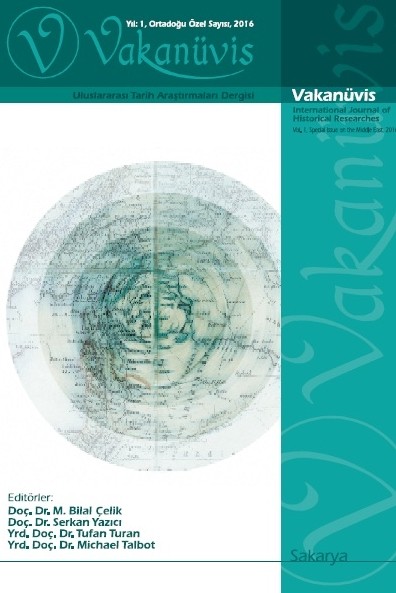Rusya, İngiltere ve Doğu Rumeli Vilayetinin Kuruluşu
Şarki Rumeli Vilayeti, Rusya, İngiltere, Balkanlar
Russia, Britain and the Establishment of the Province of Eastern Rumelia
Eastern Rumelia, Russia, Britain, Balkans,
___
- Books Clayton, Gerald David, Britain and the Eastern Question: Missolonghi to Gallipoli, London 1971. Lady Gwendolen, Cecil, Life of Robert Salisbury, Vol. II, London 1921. Kosev, Konstantin, Bismark, Iztochnia vapors i Bulgarskoto osvobojdenie 1856-1878g., Sofia 2003. Manolova, Maria, Rusia i konstititsionnoto ustroistvo na Iztochna Rumelia, Sofia 1975 Sbornik dogovor Rossii s drumu gosudarstwami 1856-1917, Moskva 1952 Palangurski, Mitko, Nova Istoria na Bulgaria I. Knyazhestvoto, Sofia, 2013 Statelova, Elena Iztochna Rumelia (1879-1885): Ikonomika, politika, Kultura, Sofia 1983. Stoyanov, Manio, Izrabotvane na Organicheskiya Ustav na Iztochna Rumelia, 1955
- Articles Glushkov, Hristo, “Frenskata diplomatsia i izborat na gubernator na Iztochna Rumelia(1878-1879)”, Bulgarian Historical Review 1-2, (2006), pp.163-179 Medlicott, W. N., and Richard G. Weeks. "Documents on Russian Foreign Policy, 1878-1880: Section II: January-February 1879." The Slavonic and East European Review 64/2 (1986), pp. 237-255. Mirkova, Anna, “Population Politics” at the End of Empire: Migration and Sovereignty in Ottoman Eastern Rumelia, 1877–1886, Comparative Studies in Society and History, 55/4 (2013), pp.955–985. Treaty between Great Britain, Germany, Austria, France, Italy, Russia and Turkey for the Settlement of Affairs in the East: Signed at Berlin, July 13, 1878, The American Journal of International Law 2/ 4 (1908), pp.401-424.. Weeks, Richard G. "Peter Shuvalov and the Congress of Berlin: A Reinterpretation." The Journal of Modern History, 51/ 1 (1979), pp.1055-1070.
- Newspapers “Maritsa”, October 13, 1878 “Maritsa”, October 17, 1878
- Archive Documents F.O. 65/1042 F.O. 65/1044 F.O. 78/3033 F.O. 78/3035 F.O. 78/3036 F.O. 78/3041 F.O. 93/81/47 F.O. 195/1214 F.O. 105/1215 F.O. 901/1 F.O. 901/9 F.O. 901/11 F.O. 901/12 KMF 04
- Published Documents House of Commons, ”Correspondence Respecting the Proceedings of the European Commission for the Organization of Eastern Roumelia”, Turkey No.9 (1879) House of Commons, “Correspondence Relating to the Treaty of Berlin, with the Protocols of the Congress”, Turkey No. 39 (1878)
- ISSN: 2149-9535
- Başlangıç: 2016
- Yayıncı: Serkan YAZICI
Ejderhan Seferi ve Don- Volga Kanal Projesi
XX. Yüzyıl Başlarında Ertuğrul Sancağında İpek Üretimi
Rusya, İngiltere ve Doğu Rumeli Vilayetinin Kuruluşu
Milli Mücadele Yıllarında Bilecik’te Yaşanan Firar Olayları
Halepli Paul’un Seyahatnamesine Göre Sibirya
II. Meşrutiyet’in İlanı Sırasında Kaybedilen Balkan Toprakları ve Olayların Basına Yansıması
Birinci Dönem Türkiye Büyük Millet Meclisi'nde Kayseri Vekillerinden Ahmet Rifat Çalıka
Tek Parti İktidarında Burdur’da İdari Alanda Yapılan Düzenlemeler (1923-1950)
Osmanlı Devleti’nde Demokratikleşme ve Kanun-ı Esasi’nin Demokratik Hüviyeti
II. Meşrutiyet Dönemi İktidar Oluşumu Sürecinde Basının Rolü
